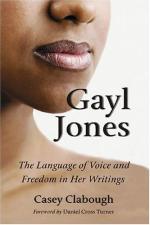|
This section contains 7,004 words (approx. 24 pages at 300 words per page) |

|
SOURCE: “Angry Arts: Silence, Speech, and Song in Gayl Jones's Corregidora,” in African American Review, Vol. 28, No. 4, Winter, 1994, pp. 559-70.
In the following essay, Gottfried posits that Jones addresses an unusual topic for an African-American woman author by examining the roles of power in sexual ownership and political empowerment.
Gayl Jones's Corregidora (1975) painfully, often brutally, explores rigid definitional boundaries of the self. Dealing with four generations of black Brazilian-American women who are strictly defined initially by a slaveholder/procurer and then by themselves, the novel challenges us to think about how the system of slavery reifies a concept of black women as hypersexual by regarding them as property. Great Gram Corregidora charges her family to “bear witness,” to have children who must memorize her old slavemaster CorregiDora's atrocities and recite them at Armageddon, “when the ground and the sky open up to ask them that question That's going...
|
This section contains 7,004 words (approx. 24 pages at 300 words per page) |

|


